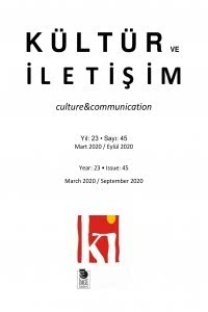Diasporada Etnik ve Kültürel Kimliğin Yeniden Üretimi
Bu makale İngiltere'de yaşayan Müslüman Türklerin etnik, dinsel ve kültürel kimlik politikalarının anlaşılmasına çalışmaktadır. Makalenin temel amacı, Türk kimliğinin nasıl kurulduğunu ve geleneksel değerlerin genç kuşaklara aktarılmasında aile, kültür, dinsel gruplar ve diğer örgütlerin rolünü incelemektedir. Çalışma İngiltere'de yaşayan Türkler arasında uygulanan etnografik bir araştırmaya dayalıdır. Araştırma yöntemleri, katılmalı gözlem, derinlemesine mülakat ve anket taramasıdır (survey). Etnografik verilerin toplanmasına yönelik saha çalışmasının on yedi ayı Londra'nın kuzey-doğusunda ve iki ayı Berlin'de yürütülmüştür. Araştırma sırasında 77 derinlemesine mülakat yapıldı, 93 Türk gencine survey ve 29 kişiye grup mülakat uygulandı.
Anahtar Kelimeler:
İngiltere, diaspora, Müslüman Türkler, kültürel kimlik
Reproducing Ethnicity and Cultural ldentity in Diaspora
This article seeks to come to an understanding of the politics of ethnicity, identity and religion among Turkish Muslims in Britain. The main objective of this article is to analyse how Turkish identity is constructed and what are the roles of family, culture, organisations and religious groups in the reproduction and transmission of traditional values to the young generation. This article is based on an ethnographic research among Turkish residents in Britain Research methods involved participant observation, in-depth interviews anda survey. Seventeen months of fieldwork in the north-east London and two months fieldwork in Berlin were carried out to collect ethnographic data. During the research, 77 people were interviewed in-depth. 93 young Turks participated in a survey and 29 people took part in group interviews
Keywords:
Turkish Muslims in Britain, ethnicity, identity,
___
- Jhally, S. (1993). •commu~icatio~s and the Materialist Conception of History: Marx, lnnis and Technology . Contınuum: The Australian Journal of Media & Culture. (7)1. Josipovici, G. (1982).
- Writing and the Body. Princeton, NJ: Princeton University Press. Lecercle, J. (1990).
- The Violence of language, London: Rout!edge. Marx, K. (1973)
- . Capital Vol. !. NY: lnternational Publishers. Marx, K. and Engels. F. (1969 ).
- German ldeology. N.Y.: lnternational Pub!ishers. Mulgan, G. J. (1994).
- "The Dynamics of Electronic Networks." The Polity Reader in Cultural Theory. Landon: Polity Press. Mcluhan, M. {1962).
- Gutenberg Galaxy.. T oronto: University of Toronto Press. Mcluhan, M. (1964).
- Understanding the Media. NY: Signet. Morris, S. (1992).
- TakingA ncient Mythology Economical/yL. eiden: L J. Brill. Morris, S. (1995)
- . Economic Strucrures of Antiquity. Wesport, Conn: Greenwood Press. Ong, Walter (198~).
- "Writing is a Technology that Restructures Thought." The Writren Word: Lıteracy in Transition. G. Bauman (der.) içinde. Oxford: Oxford University Press. Ong, W. (1974).
- "The Hist~ry ~nd The Fut~re of Verbal Media." in Silverstein, A.· (ed.) Human Communıcatıon: Theoretıcal Exp/orations. NewYork: John Wifey & So s pp.165-184. n, SchiUer, H. (1976):
- Communication and Cufturaf Domination. White Plains, NY: lnternatıona! Arts and Sciences Press. Siegelaub, .s.(1 979),
- "A Communication on Communication." ın Mattelart, A. ımd s. Sıegelaub (eds.) Communication and Class Strugg/e, Vof. /. N.Y.: !nternational General, pp. 11-22. Williams, R, (1974).
- Te/evision:T echnologya nd Cultural Form. Landon: fontana. Wolkstein, O. & Kramer, S. (1983). lnanna: Queen of Heaven and Earth NY: Harper & Row.
- ISSN: 1301-7241
- Yayın Aralığı: Yılda 2 Sayı
- Başlangıç: 1998
- Yayıncı: İmge Kitabevi Yayınları
Sayıdaki Diğer Makaleler
İdeoloji Kuramlarında Özne: Althusser ve Gramsci
Eski Çağlar ve İlk İmparatorluklardaki Egemen İletişim Biçimleri Üzerine Bir Değerlendirme
Diasporada Etnik ve Kültürel Kimliğin Yeniden Üretimi
Geleneksel Yayıncılığa Alternatif Bir Medya Modeli Olarak
Erdal Dağtaş- GÖKHAN DERELİOĞLU
Marjinlerde Casusluk: George Smiley ve Pug Henry
Öküzün A'sı: Elektronik Çağda Yazılı Kültürün Çöküşü ve Şiddetin Yükselişi
